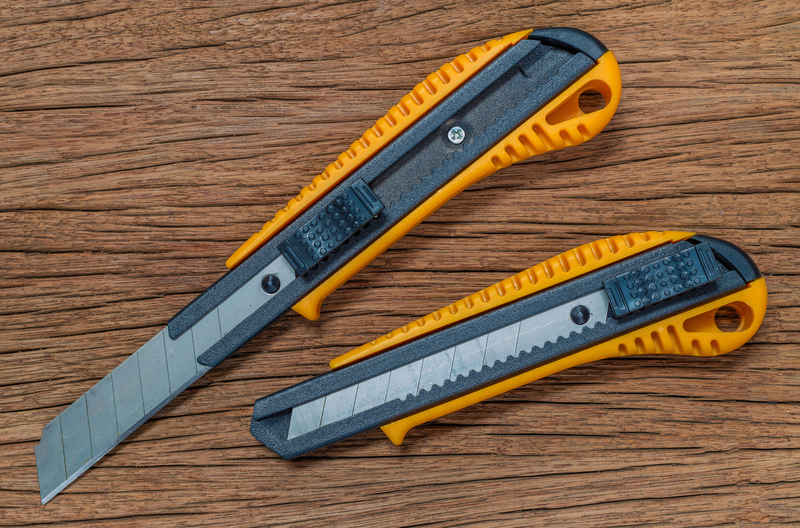Top Packing Tips for a Seamless Moving Experience
Posted on 21/05/2025
Top Packing Tips for a Seamless Moving Experience
Planning a move and feeling overwhelmed by the thought of packing? You're not alone. Whether you're relocating across town or moving across the country, proper packing can make the entire process easier, faster, and less stressful. In this comprehensive guide, we'll share top packing tips for a seamless moving experience that will help ensure your relocation is organized, efficient, and damage-free.

Why Proper Packing Matters When Moving
Poor packing often leads to broken items, misplaced boxes, and unnecessary chaos. By investing some time and effort into packing smartly, you're not only safeguarding your belongings, but also streamlining unpacking at your new home. Well-organized packing significantly reduces stress, saves money, and helps you settle in quicker.
Comprehensive Packing Checklist for Moving
Before diving into the nitty-gritty of packing, here's a checklist to guide your preparations:
- Sort and declutter every room
- Gather necessary packing supplies
- Plan the order of packing (non-essentials first)
- Reserve adequate time for each task
- Label boxes and create a moving inventory
- Set aside an essentials box
Start With a Packing Plan
The first step towards a smooth moving experience is to create a plan. Assess the size of your home, the volume of your belongings, and set a realistic moving date. Break down your packing process into manageable tasks, and allocate specific days or weekends to each room or area.
1. Declutter Before You Pack
Don't make the mistake of packing items you no longer need or use. Take this opportunity to sort and minimize your belongings. Here's how to go about it:
- Divide items into categories: keep, sell, donate, recycle, or discard.
- Ask yourself: Have I used this in the past year? Is it worth the cost of moving?
- Organize a garage sale or list items online to lighten your load and possibly earn some extra cash.
- Dispose of old paperwork, broken electronics, and expired products responsibly.
Decluttering reduces moving costs, saves time, and means you'll unpack only what you truly need in your new space.
2. Gather Quality Packing Supplies
The right materials can be the difference between broken items and a seamless move. While it may be tempting to source free boxes, ensure any used materials are sturdy and in good condition. Here's what you'll need:
- Various sized moving boxes (small, medium, large, specialty)
- Strong packing tape and a tape dispenser
- Bubble wrap, packing paper, or foam peanuts
- Markers, colored labels, or stickers for easy identification
- Stretch wrap for securing furniture and drawers
- Ziplock bags for screws and small parts
- Scissors, utility knives, and a notepad
Don't forget specialty boxes for dishes, mirrors, and wardrobes - they're worth the investment for the protection they provide.
3. Use Smart Packing Strategies
Packing efficiently is key for a smooth moving day. Consider these proven techniques:
- Pack least-used items first: Start with out-of-season clothing, guest linens, and rarely used appliances.
- Room-by-room approach: Focus on one room at a time to prevent overwhelm and keep items together.
- Fill boxes appropriately: Heavy items go in small boxes, while lighter items can fill larger ones. Don't overload - every box should be liftable by one person.
- Keep it balanced: Distribute weight evenly in each box to avoid tipping or damage.
- Wrap fragile items: Use bubble wrap, packing paper, or soft clothing.
- Roll rather than fold: Roll clothing to maximize space and reduce wrinkles.
4. Label Every Box Thoroughly
When it comes to stress-free moving, effective labeling is your best friend. Here are some best practices:
- Write the room, contents, and even a description ("kitchen - pots and pans - fragile")
- Use colored tape or stickers for quick room identification
- Number boxes and keep a written inventory for easy reference
- Mark 'FRAGILE' or 'THIS SIDE UP' where needed
With clear labels, unpacking becomes swift and avoids confusion.
5. Protect Your Valuables
Not all items are replaceable. Take extra steps to safeguard your valuables during the move:
- Keep jewelry, important documents (passports, birth certificates), and expensive electronics with you
- Use secure containers or lockboxes for sensitive items
- For artwork or heirlooms, invest in specialty wrapping and consider insurance
- Back up digital files in case of damage to computers or storage devices
For larger moves, consider renting a safe deposit box or asking a trusted friend to safeguard your irreplaceables temporarily.
Techniques for Packing Specific Items
Kitchen and Fragile Items
The kitchen often takes the most time to pack because of the abundance of fragile items. Here's how to minimize damage:
- Use dish pack boxes and cell dividers for glassware and plates
- Wrap each item individually in packing paper and cushion with towels or bubble wrap
- Nest cups and bowls, placing the heaviest items at the bottom
- Bundle silverware and utensils
- Use original boxes for small appliances when possible
- Defrost, clean, and dry your fridge and freezer a day before moving
Clothes and Linens
Strategy is everything when it comes to clothing:
- Wardrobe boxes: These let you move hanging clothes directly onto a rail
- Vacuum bags: Save space by compressing bulky bedding or seasonal clothing
- Shoes and accessories: Stuff shoes with socks and wrap pairs to prevent crushing
- Use suitcases for heavier items (jeans, sweaters) to utilize existing luggage
Electronics and Appliances
- Take photos of wiring setups for easy reconnection
- Pack devices in original boxes or use bubble wrap and sturdy boxes
- Label cords and keep all components together in bags attached to the main device
- For big appliances, disconnect, defrost, and dry them a few days before moving
Furniture and Large Items
- Disassemble beds, tables, and shelves when possible; keep screws or bolts in labeled bags
- Wrap wood furniture in moving blankets or bubble wrap
- Protect corners and legs with foam padding
- Use stretch wrap to secure drawers and doors
- Load large items first in the truck for balance
Packing Tips for Moving With Kids or Pets
Moving with children or pets adds another layer of complexity. Stay organized for everyone's sake:
- Pack an overnight bag for each family member with essentials
- Keep favorite toys, snacks, or comfort items handy
- Set up a safe space away from packing chaos for pets
- Update identification tags and microchips before the move
- Transport pets and kids to your new home separately if possible
Don't Forget Your Essentials Box
This should be the last box loaded and the first one opened at your new home. What should you include?
- Toiletries and personal hygiene items
- Medications and first-aid kit
- Chargers, electronics, and small tools
- Basic kitchenware (kettle, coffee, snacks)
- Sheets, towels, and a fresh change of clothes
- Important documents and valuables
With an essentials box, you can comfortably survive the first 24 hours even if you haven't unpacked everything else.
Bonus Moving and Packing Tips
Pack Ahead - Don't Procrastinate
Last-minute packing is a recipe for disaster and stress. Set aside time each day or weekend to pack a few boxes. Even 30 minutes a day will add up and make a significant difference come moving day.
Take Measurements in Advance
Before the move, measure doorways and larger furniture to ensure everything will fit into your new space. If necessary, disassemble items or consider alternative routes to avoid moving day headaches.
Update Your Address and Utilities Early
Notify banks, insurance companies, utilities, and subscription services of your new address in advance. Transfer or schedule new utility connections and internet so you're not left in the dark or disconnected when you arrive.
Top Packing Mistakes to Avoid
- Leaving packing until the last minute
- Packing boxes that are too heavy
- Failure to protect fragile items properly
- Not labeling or tracking contents
- Forgetting an essentials box
- Overlooking arrangements for pets, kids, or plants
Avoiding these mistakes helps ensure a smooth and efficient transition to your new home.

Should You Consider Professional Packing Services?
If budget allows or your timeline is tight, professional packers can efficiently handle the entire process. They bring expertise, packing materials, and insurance coverage for your items. Compare costs, check reviews, and decide what's right for your needs and peace of mind.
Final Thoughts on Packing for a Seamless Move
Packing doesn't have to be a source of anxiety. By following these top packing tips for a seamless moving experience you'll stay organized, protect your belongings, and make moving into your new space an exciting new adventure instead of a stressful ordeal. Remember to start early, pack methodically, and keep a positive attitude - you're not just moving your stuff, you're starting a new chapter!
Ready to make your next move easier? Save, share, or print this guide and refer back to these expert tips every step of the way. Here's wishing you a seamless, stress-free move!
Latest Posts
Making a Fresh Start: Clean Your Home Thoroughly Before Moving
Declutter and Discover a Fresh Start Before Relocating
Guide to Securely Storing a Freezer During Off-Periods





